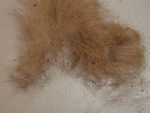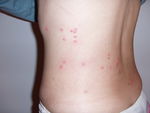Flea Habitat and Control
Habitats
- Only approximately 5% of the flea population will be on the animal at any one time (and usually it is a much smaller percentage)
- The rest of the population are in the environment
- E.g. Eggs, larvae, pupae and unfed adults
- Fleas accumulate in certain hot spots where the animal spends the majority of its time
- E.g. Warm, shady, humid ares
- E.g. Outdoors in warmer climates or inside in temperate climates
- Very large numbers of eggs are found in areas where cats land after jumping as they have been dislodged
- E.g. Beside sofas
Control
- Single or occasional treatments will only give temporary relief from fleas as the majority of the population is in the environment
- Appropriate action must be taken to stop re-infestation
- The animal must be rid of its resident flea population
- The animal should be protected against subsequent re-infestation
- From within the home
- From outside the home
- The environmental reservoir population should be eliminated
- Animal treatment to deplete reservoir
- Adulticides
- Adulticides with larvicidal effects
- Insect growth regulators (IGR's)
- Direct chemical treatment of domestic environment
- Insecticides
- Insect growth regulators
- Inorganic chemicals
- Entomophagous nematodes (These are parasitic nematodes which predate other parasite eggs)
- Animal treatment to deplete reservoir
- To prevent resistance occurring, control methods should not rely solely on chemical methods
- Hygiene such as regular vacuuming and washing of the animal's bedding should also occur for the most effective treatment
- For more information on the chemicals used for flea treatment click here

